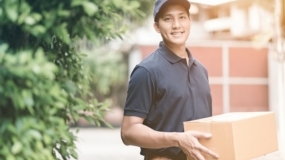A Match Made in Delivery: Food and Alcohol at Your Doorstep
Wednesday, May 15, 2019
By David Gaudet
Last Fall, we took an in-depth look at alcohol delivery services and varying state rules and regulations for legal delivery (read Door-to-Door Alcohol Delivery). This time, we’re shining light on food delivery services and their plight to make groceries/meals and alcohol delivery a simultaneous occurrence.
The rise of smartphone apps and web-based platforms, like GrubHub, UberEats and Instacart, make fresh food delivery a reality for many mom and pop, local and national restaurants and grocery stores that don’t operate their own delivery service. The same digital dashboards are making alcohol delivery alongside meals and grocery items a reality. For the consumer, the pairing is convenient; for the restaurant or grocery store, there are dramatic financial gains to be had. If only the barrier to entry made execution as simple…
According to The National Association of Convenience Stores, antiquated and inconsistent laws from state to state and at the local-level muddle the lawful execution of alcohol delivery for online retailers. And as the rise of technology would have it, these laws simply aren’t in line with the on-demand, digital world we’re living in.
Examples of Alcohol Delivery Laws
In Tennessee, delivery service licenses can be obtained through the state’s Alcoholic Beverage Commission (TABC). License requirements mandate at least half of the outfit’s delivery sales must come from the sale of prepared food. Delivery companies are prohibited from storing or reselling alcoholic beverages and they must only employ those who are 21-years of age, have an individual TABC permit and have successfully completed third-party criminal background check.1
The State of Louisiana is currently wrestling to obtain the necessary approvals to make home delivery of alcohol, alongside food, by restaurants, grocers and food delivery services legal. If House Bill 349 passes, it will become a reality. Specifics within the proposed bill would give third-party deliverers the right to refuse alcohol delivery to intoxicated customers. The bill does not include hard liquor delivery.2
In Wisconsin, state law mandates alcohol sales by retailers must occur at the licensed premises, with the buyer and seller face-to-face at the time of sale.3
California, Connecticut, Florida, Illinois, Kentucky, Massachusetts, Minnesota, Missouri, North Carolina, Ohio, Oregon, Texas, Virginia, Washington and Washington, DC allow for alcohol delivery, according to Instacart.4
Little to no consistency is shared across state lines for alcohol delivery practices and regulation. If you provide a food and alcohol delivery service, or you’re considering the deployment of one or both services, check with your state licensing board to ensure compliance with state and local regulations. For assistance or additional support, contact The BARS Programat customerservice@barsprogram.comor 1-877-540-5500.




